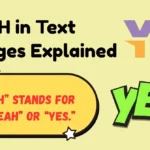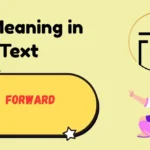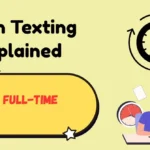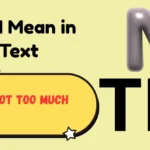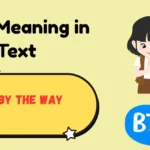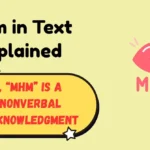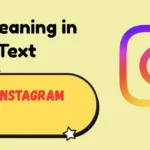Texting today is full of abbreviations, shortcuts, and slang that make conversations faster and snappier. Among these, OFC is one of the most commonly used, but not everyone fully understands its meaning, tone, or when it’s appropriate to use.
While it seems simple at first glance, the truth is that this three-letter abbreviation carries nuance depending on who you’re texting, the context of the conversation, and even the punctuation you use.
This guide breaks down OFC in texting, from its definition and origin to cultural implications and practical examples. By the end, you’ll know exactly when to type “OFC” and when to avoid it.
What Does OFC Mean in Texting?
At its core, OFC stands for “Of Course.”
It’s a shorthand expression used to show agreement, confirmation, or reassurance. In texting, it often replaces the full phrase to save time and space.
Examples:
-
Friend: “Can you pick me up later?”
You: “OFC.” -
Coworker: “Are you still joining the Zoom call?”
You: “OFC, see you in five.”
Unlike some internet slang that can feel confusing, OFC usually keeps its straightforward meaning. However, tone plays a big role in how it’s received. Sometimes it feels warm and supportive; other times it can come across as sarcastic.
Origin of OFC
The abbreviation OFC first appeared in online chatrooms and forums in the early 2000s, when people started shortening phrases to type faster. It gained traction during the rise of instant messaging platforms like AOL Instant Messenger, MSN, and later evolved with the spread of texting culture on mobile phones.
With the arrival of smartphones, social media apps like Twitter and Instagram, and messaging services like WhatsApp, OFC became a staple shorthand. Today, it’s not unusual to see OFC in texts, gaming chats, TikTok comments, and even workplace Slack groups—though its appropriateness depends on the audience.
The Nuanced Meaning of “Of Course” in Digital Communication
While “of course” sounds straightforward, digital communication strips away tone of voice and body language, leaving the interpretation open.
Here’s how the meaning shifts:
-
Literal/Neutral: Confirmation or agreement.
“OFC, I’ll email that now.” -
Reassuring: Offering warmth and support.
“OFC I’ll be there for you, don’t worry.” -
Sarcastic: Highlighting something obvious or frustrating.
“OFC you forgot your keys again 🙃.”
The lack of vocal inflection means punctuation, emojis, and context take on greater importance when using OFC in texting.
When Should You Use OFC?
OFC works best in casual, friendly, and familiar conversations. Here are the main scenarios:
- Quick affirmations in group chats.
- Casual confirmations with friends and family.
- Gaming or online communities where abbreviations are the norm.
-
Lighthearted reassurances like:
“OFC, you’ll crush it at your presentation!”
✔️ Examples of good usage:
- “OFC I’ll save you a seat.”
- “Need help moving? OFC!”
- “OFC, I’ll bring dessert tonight.”
In these situations, OFC saves time while keeping the tone light.
When to Avoid OFC
Despite its popularity, there are times when OFC is not the best choice.
Avoid in professional contexts:
- Business emails.
- Formal workplace messages.
- Communication with clients or superiors.
Avoid when clarity matters:
- When speaking with non-native English speakers.
- When the tone could be misread as sarcastic.
Avoid in sensitive conversations:
- Comforting someone after bad news.
- Discussing serious topics where shorthand might feel dismissive.
❌ Examples of poor usage:
-
Boss: “Can you confirm if the report is ready?”
You: “OFC.” (Sounds unprofessional.) -
Friend: “I’m feeling really down today.”
You: “OFC.” (Feels cold or dismissive without context.)
Is OFC Ever Rude or Sarcastic?
Yes—OFC can sound rude if used in the wrong way.
Since texting lacks tone of voice, what you mean and what the other person reads can differ.
For example:
-
Supportive tone:
“OFC I’ll cover for you, no problem!” -
Sarcastic tone:
“OFC you didn’t study again 🙄.”
Notice how punctuation and emojis shift the feeling. Adding 🙄, 😅, or 😂 can tilt it toward sarcasm. Leaving it plain makes it feel neutral.
Alternatives to OFC (Based on Tone and Relationship)
Sometimes, you need more than just “OFC.” Depending on context, here are better options:
| Tone | Alternatives | Example |
|---|---|---|
| Casual/Friendly | For sure, Sure thing, Definitely | “For sure, I’ll join you guys tonight.” |
| Polite/Supportive | Absolutely, Certainly, No problem at all | “Absolutely, happy to help you move.” |
| Warm/Encouraging | You can count on me, Always, Naturally | “Always, I’ll support you through this.” |
| Neutral/Professional | By all means, Without a doubt, Definitely | “Without a doubt, the report will be ready.” |
Tip: When in doubt, spell out the full phrase “Of course” for clarity.
Tone and Social Context: Why It Matters
The same word can feel warm in one context and cold in another. OFC in texting depends heavily on your relationship with the person.
- Close friends: OFC feels casual and affectionate.
- Coworkers: It might feel too laid-back.
- Acquaintances: Could be seen as dismissive.
Tone is also shaped by:
- Punctuation (“OFC!” vs. “OFC.”).
- Emojis (“OFC 😊” vs. “OFC 🙄”).
- Timing (replying instantly vs. hours later).
Tone Variations of OFC in Real Use
Let’s break down how the same abbreviation can take on different shades:
-
Supportive:
“OFC, I’ll help you edit your essay.” -
Neutral:
“OFC, I’ll be there at 8.” -
Sarcastic:
“OFC you’re late again 😂.”
Case Study Example:
Imagine two coworkers texting:
- Coworker A: “Did you finish the slides?”
- Coworker B: “OFC.”
This could mean:
- Polite confirmation.
- Subtle irritation, like “Obviously.”
- Sarcasm if the relationship is tense.
This shows why being intentional with tone matters.
Cultural Sensitivity with OFC
Language use differs across cultures. OFC in texting may not always translate smoothly.
- Non-native English speakers may interpret it literally, missing sarcasm.
- In some cultures, brevity is seen as efficient. In others, it feels rude.
- Younger generations often read OFC as casual, while older ones may see it as dismissive.
Tip: When texting internationally or in mixed groups, avoid relying on OFC if tone could be misunderstood.
Key Takeaways: Be Intentional with Language
- OFC means “Of Course.”
- It works best in casual, familiar conversations.
- It can sound rude or sarcastic depending on tone.
- Alternatives provide more clarity in professional or sensitive situations.
- Context, punctuation, and emojis change the meaning drastically.
Remember: The right phrase at the right time strengthens relationships, while the wrong one can create confusion.
FAQs About OFC in Texting
What does OFC mean on Snapchat, Instagram, or TikTok?
It still means “Of Course.” The tone depends on context—playful, casual, or sarcastic.
Is OFC formal or informal?
OFC is informal. Use “Of course” or alternatives like “Certainly” in formal settings.
Can OFC be used in professional chats?
Not recommended. It can feel dismissive or unprofessional. Stick to “Absolutely” or “Of course.”
What’s the difference between OFC and OMG?
OFC = Of Course (agreement/confirmation).
OMG = Oh My God (surprise, shock, excitement).
How do you know if someone’s being sarcastic with OFC?
Look at context clues: emojis, punctuation, and the history of the conversation.
Conclusion
OFC in texting is simple but powerful. It saves time, conveys agreement, and adds casual tone—but it can also slip into sarcasm if not used carefully. The secret lies in being mindful of context, audience, and tone.
When clarity matters, use full words. When casual speed is fine, OFC works perfectly. Language evolves with digital culture, but the golden rule remains: communicate with intention.

